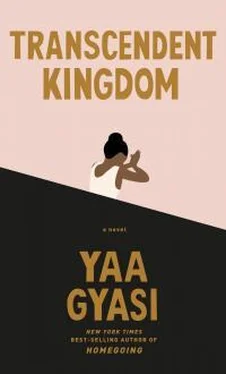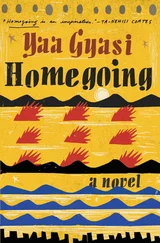I was bad at most parties but good at these. It’s remarkable how cool you can seem when you are the only black person in a room, even when you’ve done nothing cool at all. I wasn’t close to anyone at the party, certainly not close enough to tell them about my mother, but by the end of the night, the alcohol had loosened my lips and I started to get comfortable, to talk around the subject I most wanted to talk about.
“Do you think you’ll ever go back to practicing psychiatry?” I asked Katherine. She was one of the more senior members of my lab, a postdoc who’d done her undergraduate studies at Oxford and a medical degree at UCSF before starting her PhD here. We had a tentative friendship, predicated mostly on the fact that we had both been raised in immigrant families and that we were two of the only women in the department. I always got the sense that Katherine wanted to get to know me better. She was friendly and open, too open for my comfort. Once, in the lounge, Katherine had confided in me that she had snooped through her husband’s things and found little “o’s” written in his calendar on the days when she was ovulating, and she thought that maybe he was trying to trick her into having a baby sooner than the time frame they’d planned on. She’d been so free with that information, like she was telling me about a cough she couldn’t kick, but I was enraged, self-righteous. “Leave him,” I said, but she didn’t, and as I talked to her, Steve, her husband, was on the other side of Han’s living room, sipping sangria, his head tilted back just slightly so that I could see his Adam’s apple bob as the drink moved down. Knowing what I knew about Steve, I couldn’t look at him, his Adam’s apple, and not see a kind of menace, but there he was talking, drinking, ordinary.
“I think about going back to my practice all the time,” Katherine said. “With medicine, I could see that I was helping people. A patient would come in, so wracked with anxiety that they were scratching their arms raw, and months later, no scratches. That’s gratifying. But with research? Who knows.”
My mother had hated therapy. She went in arms raw, came out arms raw. She was distrustful of psychiatrists and she didn’t believe in mental illness. That’s how she put it. “I don’t believe in mental illness.” She claimed that it, along with everything else she disapproved of, was an invention of the West. I told her about Ama Ata Aidoo’s book Changes, in which the character Esi says, “you cannot go around claiming that an idea or an item was imported into a given society unless you could also conclude that to the best of your knowledge, there is not, and never was any word or phrase in that society’s indigenous language which describes that idea or item.”
Abodamfo. Bodam nii. That was the word for “crazy person,” the word I’d heard my aunt use that day in Kejetia to describe the dreadlocked man. My mother refused this logic. After my brother died, she refused to name her illness depression. “Americans get depressed on TV and they cry,” she said. My mother rarely cried. She fought the feeling for a while, but then one day, not long after the Naked Egg experiment, she got into her bed, got under the covers, and wouldn’t get back up. I was eleven. I was shaking her arm as she lay there in bed, I was bringing her food before walking to school, I was cleaning the house so that when she finally woke up she wouldn’t be upset with me for letting the place turn to filth. I was doing okay, I thought, so when I found her, sinking in the bathtub, the faucet running, the floor flooded, the first thing I felt was betrayed. We were doing okay.
I looked at Katherine’s stomach. Still flat, all of these months later. Was Steve still making little “o’s” in his calendar? Had she told him that she knew about his betrayal or did she keep it to herself, hold it in the clenched fist of her heart to open only when something between them was truly broken?
I had never been to therapy myself, and when the time came for me to choose what to study, I didn’t choose psychology. I chose molecular biology. I think when people heard about my brother they assumed that I had gone into neuroscience out of a sense of duty to him, but the truth is I’d started this work not because I wanted to help people but because it seemed like the hardest thing you could do, and I wanted to do the hardest thing. I wanted to flay any mental weakness off my body like fascia from muscle. Throughout high school, I never touched a drop of alcohol because I lived in fear that addiction was like a man in a dark trench coat, stalking me, waiting for me to get off the well-lit sidewalk and step into an alley. I had seen the alley. I had watched Nana walk into the alley and I had watched my mother go in after him, and I was so angry at them for not being strong enough to stay in the light. And so I did the hard thing.
In undergrad, I used to poke fun at psychology—a soft science. It was about the brain and cognition, yes, but it was also about mood—feelings and emotions created by the human mind. Those feelings and emotions seemed useless to me if I couldn’t locate them in data, if I couldn’t see how the nervous system worked by taking it apart. I wanted to understand why the feelings and emotions came about, what part of the brain caused them, and, more important, what part of the brain could stop them. I was such a self-righteous child. First, in the days of my Christianity, when I said things like “I’ll pray for you” to my classmates who were reading books about witches and wizards. Then, in those first few years of college, when I become dismissive of anyone who cried about breakups, who spent money frivolously, who complained about small things. By that time my mother had already “healed through prayer,” as Pastor John put it. Healed, but in the way a broken bone that’s healed still aches at the first signs of rain. There were always first signs of rain, atmospheric, quiet. She was always aching. She would come visit me when I was in undergrad at Harvard, bundled up against the winter, even if it was spring. I’d look at her coat, her head scarf wrapped tight, and wonder when I had stopped thinking of her as a strong woman. Surely, there’s strength in being dressed for a storm, even when there’s no storm in sight?
The party was winding down. Han’s ears looked like they would be hot to the touch.
“You shouldn’t play poker,” I said to him. Almost everyone had gone at this point. I didn’t want to go home. I hadn’t been drunk in such a long time, and I wanted to linger in the warmth of it.
“Huh?” Han said.
“Your ears are a tell. They turn red when you’re drunk and when you’re embarrassed.”
“So maybe I should only play poker when I’m drunk or embarrassed,” he said, laughing.
When I finally got back to the apartment, there were signs that my mother had gotten up from the bed. A cabinet door in the kitchen was open, a glass in the sink. We were doing okay.
9
The Chin Chin Man got a job as a janitor at a day care center. He was paid under the table, seven dollars an hour, an hour a day, five days a week. After buying a monthly bus pass, he hardly broke even, but it was something to do. “It got him off the couch,” my mother said.
The children liked him. They would climb up his tall body as though he were a tree, all limb-branches and torso-trunk. His accent delighted them. He told them stories, pretending he was one of two living-man trees from Kakum Forest. That he had started out as a small seed that rolled into the forest from bushland, that every day butterflies the size of dinner plates would flutter their wings over the earth where he was planted, trying to take root. The wind from the flapping wings would stir the ground, coaxing him to grow, grow, grow, and he did. Look how big he was. Look how strong. He’d toss one of the children in the air and catch them, tickling fiercely. The children couldn’t get enough. Half of them were butterflies for Halloween that first year, though their parents didn’t know why.
Читать дальше












